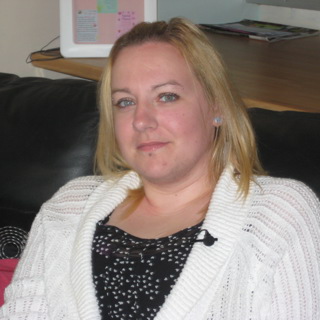Denise's story

Denise reflects on the workplace interactions that hurt her confidence and made her feel like a failure after opening up about her mental health. Denise has struggled with her mental health since she was about 14 and to this day experiences feelings of anxiety.
Since first volunteering with See Me in 2005, Denise has been open about eliminating outdated stereotypes and ideas of what the public might think of when they hear someone has a mental illness.
She said when she first opened up about her mental health, she didn’t get support from those around her.
Denise says that her experiences of public stigma have held her back in life. When she first started in a previous volunteer role at a crèche, she felt comfortable being open about her mental health to her colleagues, who were very accepting – but things soon changed.
“I looked after newborns and small children. I was upfront at that point about my mental health, and it was all great for about the first year.
“It feels like it happened overnight, but it happened over the next six months to a year. This new worker comes in, and she was paid.
“And she was always undermining me, saying what I was doing was ‘the wrong way to do it’ or telling me to go do something else.
“There was one incident where I was feeding a three-month-old baby. This worker came up to me, took the baby out of my hands and told me I wasn't doing it right.
“I went to the bosses, and I was shocked because they started acting completely different to me compared to when I started.
“I loved volunteering there. But I felt like I was getting treated like a child, and that happened to me a quite a few times until I started thinking: ‘Well, I must not be worth anything,’ and went into myself. I didn’t do anything for quite a number of years.
“It tore me apart because it was all I wanted to do since I was a young — I just love looking after children. After what they said to me, I just felt like I wasn’t allowed to be near anyone.”
Denise’s experience at the crèche made her feel like she wasn’t safe or able to look after children.
More recently, she decided to try volunteering again and this time at a food bank, wanting to give back after they helped her during the pandemic.
"It was going great. I felt like I didn’t have to hide my scars — like I didn’t have to hide anything for them and that was amazing.
“After nearly two years, things changed, and the atmosphere wasn’t very nice. At first, I thought it was just the way I felt, but even when I was feeling mentally well and I was feeling good, people were treating me differently.
“And I thought: ‘Here we go, it’s the crèche all over again’.
“They were undermining me and telling me I was doing things wrong. They were constantly at me, and I thought, I can’t do this anymore.
“It broke my heart.”
On both occasions, Denise wanted to get involved in fields she was passionate about but felt because of others' perceptions of her and her mental health, she couldn’t.
Now, she’s calling on people across Scotland to rethink the way they treat others. Denise hopes one day the public will have a basic understanding of mental health, and recognise that not everyone needs to be an expert to be able to talk about mental health.
“People still judge people with mental health issues the way did they years ago. The stigma is still there where people are holding on to that backdated view of people with mental health issues – that we don’t belong in society, and we should be locked away.
“It would’ve helped if they had taken the time out to sit down with me and talked to me. Let me explain what my mental health condition is, and the signs of what to look out for — that for me would have been one of the key things someone could do.
“Everyone has the right to feel safe and included regardless of what their mental health condition is.”
Denise reflected on the See Me's polling, where 28% of Scottish respondents said they would not want with someone with a mental illness to look after their children.
“Just because someone has a mental health issue does not mean they’re not capable of looking after children.
“I look after my friends’ children and they all are aware of my mental health. If someone reacts badly to your experience, then you’re not the problem. There needs to be better understanding, because experiencing difficulties with your mental health doesn’t mean you stop being a person.”
Denise recalls a moment when someone’s words made her feel ashamed after a stranger commented on her self-harm scars.
“I was at a swimming pool in Stirling, and I was taking a friend’s wee son at the time. We were in the baby pool when I overheard folk saying that I shouldn’t have a child, or I shouldn’t be able to be around children – not that they knew he wasn’t my son.
“They were talking about me as if I wasn’t there, and said I should be ashamed of coming out ‘in the state’ - that I shouldn’t be allowed in the pool with scars.
“One of them said I was a danger to everyone around me. I hadn’t been back to the pool since.”
Denise added that if the person had been interested in having a conversation, she would have been open to educating them – and breaking down the stigma that still causes so many to stop seeking help.
